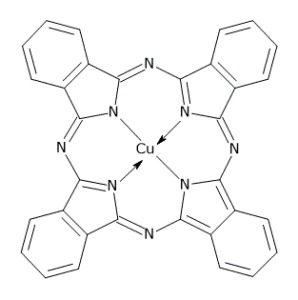Phthalocyanine blue, also known as copper phthalocyanine or by its pigment designation PB15, is a synthetic blue pigment used extensively in paints, inks, plastics, and other applications. It is valued for its intense blue color, excellent lightfastness, and chemical stability.
Chemical Formula: C32H16CuN8

Molecular Weight: 576.06 g/mol
Appearance: Deep blue crystalline powder
Solubility: Insoluble in water and most organic solvents
Phthalocyanine blue exists in different polymorphic forms, the most common being the alpha (α) and beta (β) forms:
Alpha Form: Slightly redder and softer, used in printing inks.
Beta Form: Greener and harder, used in coatings and plastics.
Paints and Coatings: Provides durable, vibrant blue hues in artist paints, industrial coatings, and automotive finishes.
Printing Inks: Used in various printing processes, including inkjet and screen printing, due to its excellent dispersion properties.
Plastics: Used in coloring plastics because it is stable under processing conditions and does not migrate.
Textiles: Employed in dyeing and printing textiles, offering high fastness properties.
Cosmetics: Occasionally used in formulations requiring bright blue pigments.
High Tinting Strength: Provides strong coloration with minimal pigment.
Lightfastness: Resistant to fading when exposed to light.
Chemical Stability: Resistant to acids, alkalis, and solvents, making it suitable for various applications.
Non-toxic: Generally considered safe for use in consumer products.
Environmental and Safety Considerations
Phthalocyanine blue is considered non-toxic and environmentally benign. However, like any industrial chemical, it should be handled according to safety guidelines to prevent inhalation or prolonged skin contact, which could cause irritation.
Phthalocyanine pigments were first discovered in the 1920s and quickly became important in the pigment industry due to their superior properties compared to earlier blue pigments, such as Prussian blue and ultramarine.
In summary, phthalocyanine blue is a versatile and highly valued pigment in many industries, offering superior performance characteristics for a wide range of applications.